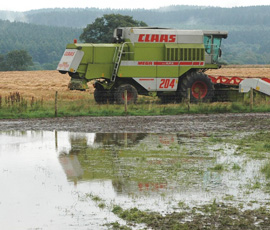Harvest headache makes national headlines

Food security is back on the agenda after the one of the most difficult harvests for 25 years saw wheat yields plummet by more than 14%.
Wheat yields are down 14.1% on the five year average, falling to 6.7t/ha – a level not seen since the late 1980s, according to the latest NFU harvest results. The prospect of food price hikes made news headlines across the national media on Wednesday (10 October).
Other cereal yields have been variable at best, prompting calls for retailers, processors, consumers and politicians to all play their part in a bid to keep a lid on prices. Unprecedented increases in livestock feed costs were likely to stay and be felt across the supply chain, the NFU warned.
Global weather events – including drought in North America – had added to upward price pressure, said NFU chief combinable crops adviser Guy Gagen. “The resulting tight supplies of many feed grains have driven up the prices of agricultural commodities around the world,” he added.
“These UK harvest results will do little to alleviate the global dynamics of commodity prices, with the prospect of relatively high commodity levels through to 2013. Cereals prices impact directly on other sectors, especially pig and poultry farmers already struggling with higher feed costs.”
Food prices are already being driven up following the worst drought for 50 years in the USA and a heatwave in Russia, according to the British Retail Consortium. But some industry leaders said it would be wrong for supermarkets to use harvest statistics as an excuse to increase food prices.
Nicola Currie, eastern region director for the Country Land and Business Association, said: “We need to adopt a ‘waste not, want not attitude’. Consumers need to make their voices heard and as a country we need to cut the amount of food waste.”
Nick Tapp, head of agribusiness at Bidwells, said higher price responses had gone some way to reduce farmers difficulties. But for many it was a case of too little too late, or, worse. Price pressure from retailers has held back a ‘normal’ market response, he added.
“The 2012 harvest will damage the capacity of a number of sectors across the industry,” said Mr Tapp. “There will be business failures on farm and in the supply chain. Food inflation is coming, but it is likely to be too little too late for some.”
For more on this topic
UK becomes net importer of wheat
